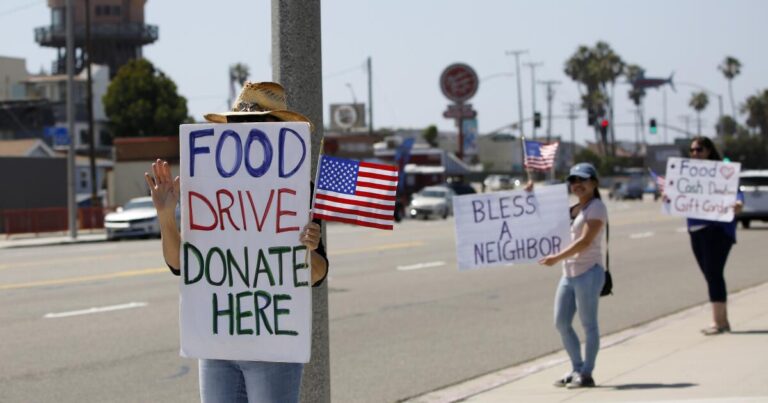By giving the Tuesday arrival days after Thanksgiving and Black Friday, we escape the glint that consumption of meals and materials items brings at peak ranges. It reminds us that we’re extra than simply shoppers.
Since Giving Tuesday was launched in 2012, it has impressed greater than $10 billion in donations. However giving is in hassle in different respects. Lower than half of American households make charitable contributionsdown practically 20% from 2000. Complete inflation-adjusted charitable giving fell greater than 10% final 12 months from the 12 months earlier than, and the share of private revenue People give is on the lowest stage in nearly 30 years.
Inequality jeopardizes the reciprocity that Giving Tuesday celebrates. A current research by the Federal Reserve Board confirmed that practically 40% of American households can’t cowl a $400 emergency, and practically 20% have $100 or much less in financial savings. That is exacerbated by excessive inflation, housing disaster and burdensome well being and childcare prices. Underneath such monetary pressures, giving again is a pressure, even for the beneficiant.
The historic beneficial properties made within the “Struggle for $15” and different wage campaigns have given method to efforts to make $20 an hour the brand new minimal to maintain up with the price of dwellingg. If the federal minimal wage had stored tempo with inflation and productiveness since 1968, it could be practically $21.50 an hour, about triple its present stage.
A dwelling wage is meant to cowl one’s primary prices—an essential step that however limits our expectations to fulfill employees’ wants, however no extra. We must always set a typical that affirms true dignity and primary safety for all employees by enabling them to take part within the charity that connects us to others and permits us to enhance our communities.
A requirement for not only a dwelling wage, however a “giving wage” would increase our imaginative and prescient of financial justice to incorporate generosity—even when in small quantities. It might insist on the humanity of employees and the significance of enabling everybody to contribute to our public life.
Franklin Delano Roosevelt argued for wages that might give employees “greater than a mere subsistence stage. I imply the wages of a good dwelling.” Our definition of a good life ought to embrace the flexibility to assist folks and causes that matter to us.
As an alternative of accepting poverty as a given, we must always raise extra folks to a stage of financial safety that makes it doable. Amidst the stress to spend and work to earn cash to spend is to supply a method to relate to cash as full human beings with relationships and communities, passions and commitments.
Alexis de Tocqueville noticed America’s voluntary associations as some of the admirable components of our democracy. “Nothing,” he wrote, “deserves extra to command our respect than the mental and ethical associations of America.” He added that it’s “solely by the mutual motion of males upon each other” that “emotions and concepts are renewed, the guts enlarged, and the human thoughts developed.”
Giving Tuesday, as one of many motion’s leaders put it, promotes “generosity not as a benevolence that they’ve present to those that haven’t however somewhat an expression of reciprocity, solidarity and reciprocity.” Breadth of participation transforms philanthropy from an elite exercise right into a collective, certainly democratic, mission through which all are stewards of the widespread good.
Giving again affirms us as residents somewhat than the jaded workforce or passive shoppers of a society managed by the rich. A dwelling wage would set up a threshold for true financial autonomy—for the flexibility not merely to outlive, however to “join, serve and uplift one another.” All of us have wants, and all of us have items and abilities to present. The trick is to honor each.
Everybody ought to be capable to apply philanthropy as a result of everybody’s humanity issues. Giving Tuesday invitations us to think about a brand new definition of first rate life that features the flexibility to present again.
Amy Schiller is a postdoc at Dartmouth School and writer of the forthcoming “The Value of Humanity: How Philanthropy Went Mistaken and Repair It.”

